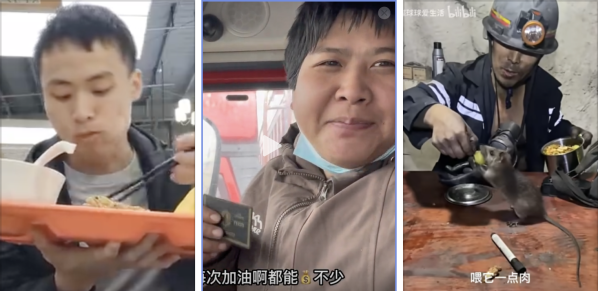
Letter from the Editors
It can be rough going back to work after a long holiday. But most of us are thankful that our jobs are still there when we return. This was the theme of some online comments from factory workers in China who feared that the extra long Golden Week holiday earlier this month was an opportunity for bosses to shut down the business and sneak away with assets. Workers would then be left without jobs and no recourse for obtaining overdue wages and benefits.
We are keeping an eye on China’s manufacturing industry to see whether workers’ holiday fears have materialised. In the meantime, we hope our readers around the world had a chance to celebrate the Mid-Autumn Festival with family and friends.
Thanks for reading!
CLB Editors
What We’re Focusing On

Shopping habits. As e-commerce has dominated retail trends in China, traditional brick-and-mortar retailers are struggling. In 2019, domestic consumer electronics retailer Suning purchased an 80 percent share in the French supermarket Carrefour’s China operations, hoping to turn the supermarket’s luck. At its peak, Carrefour had over 300 stores in China, but by 2021 the number had dropped to 205. Today, only 41 stores remain, after 106 closed in the first half of this year. This sudden spate of closures has left thousands of workers without jobs and some are owed wages and benefits. In our analysis of a series of protests at Suning offices and Carrefour stores this year, CLB asks: Who will be accountable to workers? Read more: Decline of traditional supermarkets linked to worker protests across China.
The PCB industry. China’s printed circuit board (PCB) industry is concentrated in Shenzhen, where a number of PCB factories have recently shut down or relocated to save costs. In light of the economic precarity of their employers, workers are sensitive to their labour rights vulnerability right now. At the Shenzhen Hehong Electronics Factory, workers protested wage arrears and said that the bosses took equipment out from the back of the workplace to avoid detection. Another nearby PCB factory, Hezhongxin Electronics, also declared closure recently, with workers protesting, blocking the company entrance and demanding wages to be paid. So far in 2023, CLB’s Strike Map has recorded 102 worker strikes and protests in the electronics industry. Read more: After China’s Golden Week holiday, will workers return to find closed factories?
Short video platforms. On international social media, many influencers show off their real or imagined wealth and promote products and services for brands. This, of course, also happens on China’s domestic social media, but CLB has taken note of some blue-collar workers who have gained considerable followings for broadcasting and narrating their everyday lives on the assembly line, the highway, and even deep in the coal mine. Blue-collar and migrant worker-vloggers are able to interact with their followers to bridge social barriers. By speaking directly to the public, they can reclaim agency over their lives and narrate their own stories for all to hear. Read more: Blue-collar workers narrate their own lives through popular online videos.
Worker Representation
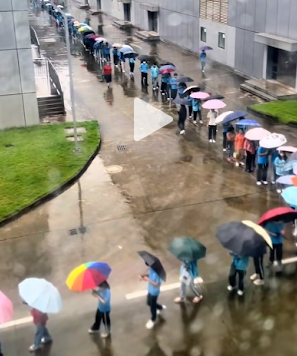
On 15 September, China Labour Bulletin covered the developing situation of workers at Zhongshan Eurotec Electronics Co. Ltd. striking over a list of 20 demands, including waiting in lengthy security lines before and after work.
Since that time, CLB has learned that the local government, local union, and factory management were in dialogue with workers, and that the enterprise union negotiated with the factory to meet some of the workers’ demands. The Eurotec factory - whose parent company is Music Tribe Manufacturing Ltd., which produces for Behringer in Germany - is in production once again.
CLB notes that the enterprise union could have done a better job to understand the concerns of workers long before they organized their list of demands and staged a several-day strike in the face of threats to their employment status.
In fact, the enterprise union did not appear to be representing workers’ interests beforehand. For example, instead of understanding workers’ concerns, the enterprise union called for workers to resume work after the fourth day of the strike, and it urged them to use legal channels and other “reasonable” measures.
Over 250 workers were written up for striking, showing that independent organizing is penalised all while the enterprise union stands by. More effective worker representation is needed for peaceful resolution of workers’ grievances, which would benefit workers, employers, and local governments alike.
Strike Action
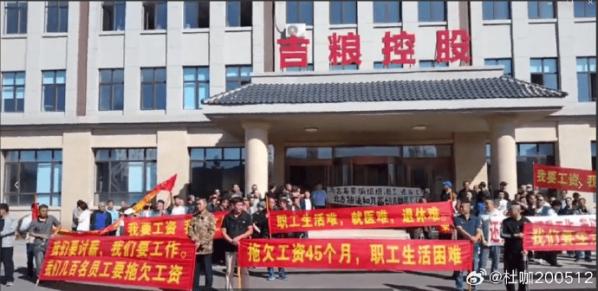
192 incidents last month. In September 2023, CLB’s Strike Map recorded 192 incidents, up from 189 in August and setting a new 2023 high. The proportion by industry has remained stable, with 56 percent occurring in the construction industry, 20 percent in manufacturing, 10 percent in services, and 6 percent in transportation.
Wage arrears at SOEs in Jilin. The five Strike Map incidents collected in Jilin province in September were all at state-owned enterprises (SOEs). China’s northeast has a high concentration of SOEs, which have long been a stable source of employment for a large number of workers in various industries. The effect of these labour rights violations on workers and retired employees of SOEs is great, and the authorities and trade unions in Jilin should step in to ensure rights are protected.
- On 9 September in Changchun, retired workers protested against social security arrears at Liaoyuan Mining Group, holding up handmade signs.
- In Siping city on 11 September, construction and infrastructure workers held a strike at a power plant project.
- On 14 September, at the Jilin Grain Group in Changchun, dozens of workers held red banners (see image, above) accusing the company of owing 45 months’ wages and causing severe hardship and affecting several hundred workers.
- In Jilin city, on 19 September, migrant construction workers protested wage arrears at the construction site of a state-owned project.
- On 28 September, workers staged a sit-in against wage arrears at China FAW Group, a state-owned auto manufacturer headquartered in Changchun.
CLB researchers took special note of the incidents at Jilin Grain Group and the Liaoyuan Mining Group, as these incidents originated with a period of mass layoffs. Jilin Grain Group entered bankruptcy and reorganization procedures in 2018, and wage arrears and owed benefits have remained unresolved since then. In June 2023, the legal process came to a close, at which time labour contracts were terminated, eventually leading to the protests last month. At the Liaoyuan Mining Group, for years workers have been gradually laid off as the national energy policy changed. Workers were only given a minimum living allowance of 670 yuan (U.S. $92), and even that was cancelled starting from 2020. Social security payments were not made to retired workers, and this prompted the September protest.
Worker Voices
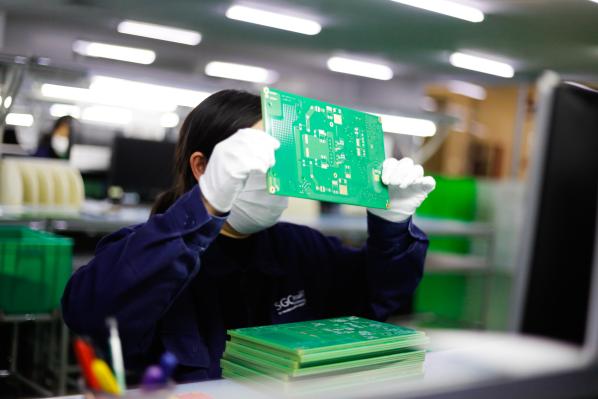
Yes, we are small fish and little shrimp in front of capital, but there is no way we will compromise. Factory life is hard, and not many people have experienced it, but for us, it is our entire youth wasted here.
Workers at the Countach Circuits (Shenzhen) Co. Ltd staged a ten-day protest and involved local authorities to achieve some success in their demand for severance compensation.
The Countach factory produces printed circuit boards (PCB) for electronic devices, and the industry in China is in decline. Workers at PCB factories in Shenzhen are on alert against sudden shutdowns, which almost inevitably lead to claims for unpaid wages and benefits, and the meagre severance packages do not comply with China’s labour laws.
When workers began the strike on 22 August, the Countach factory initially offered to pay 50 percent of the legal minimum for economic compensation upon factory shutdown. A few days into the strike, the factory raised the offer to 60 percent. Workers rejected this offer, and after an intervention from the Shenzhen municipal government, the employer raised the compensation to 70 percent, which workers accepted.
Of course, nothing short of 100 percent complies with the minimum standards of China’s labour laws, but many of the factories are out of funds in this economic environment. Some factories have been secretly removing equipment in an attempt to shelter assets, and workers have caught on to this practice, guarding factory exits day and night.
In online comments to a video about PCB factory workers striking in Shenzhen, workers shared their experiences and words of warning:
You guys are too careless. When we guarded the front doors, we also blocked all the possible exits, so that the assets couldn’t go out. No matter if it was sunny or rainy, we blocked the factory.
CLB in the News
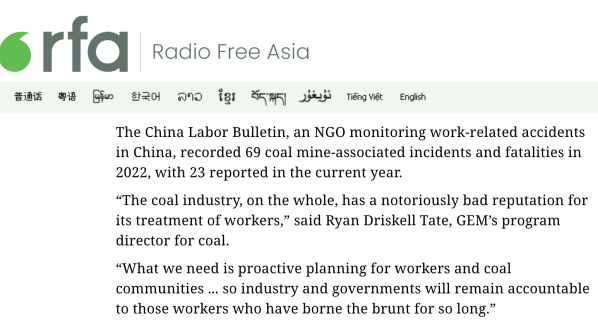
China Labour Bulletin’s Workplace Accident Map data on the coal mining industry was cited by Radio Free Asia. The RFA piece summarises a new report by Global Energy Monitor (GEM). GEM projects that 250,000 coal miners will lose their jobs in China’s Shanxi province alone by 2050, necessitating planning for this economic and energy transition.
Editors’ Recommendations
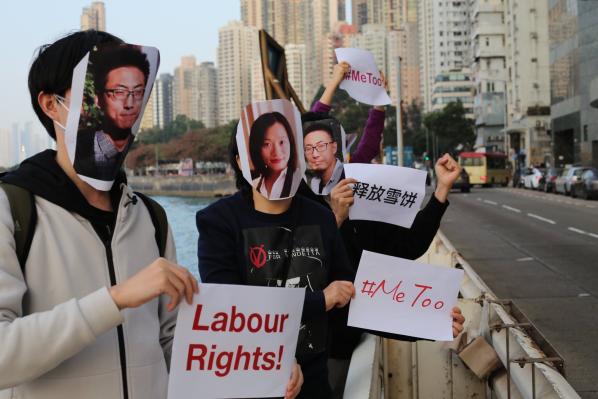
China Labour Bulletin joined over 30 other civil society organizations on 22 September to call for the immediate release of labour rights activist Wang Jianbing and independent journalist and gender rights activist Sophia Huang Xueqin. The pair stood trial that day in Guangzhou for “inciting subversion of state power.” On 23 September, the court formally charged them. They have been held in detention since their arrest in September 2021.
The joint letter states, in part:
We, the undersigned civil society groups, are deeply concerned about this case and call for the two activists’ immediate and unconditional release, as they have been detained for peacefully exercising their rights to freedom of expression and association.
